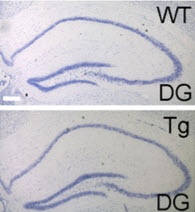A gene that stimulates growth of new brain cells in adults
June 16, 2014

Increased length of the hippocampus dentate gyrus (DG) for overexpressed TLX gene (in Tg, or transgenic mice) vs. control group (WT, or wild type) (credit: Kiyohito Mura et al./PNAS)
Over-expressing a specific gene could prompt growth in adults of new neurons in the hippocampus, where learning and memory are regulated, City of Hope researchers have found.
The study, which used an animal model, found that over-expression of the TLX gene resulted in smart, faster learners that retained information better and longer.
Understanding the link between this gene and the growth of new neurons — or neurogenesis — is an important step in developing therapies to address impaired learning and memory associated with neurodegenerative diseases and aging.
The new research was published June 9 in the Proceedings of the National Academy of Sciences.
“Memory loss is a major health problem, both in diseases like Alzheimer’s, but also just associated with aging,”said Yanhong Shi, Ph.D., lead author of the study and a neurosciences professor at City of Hope.
“In our study, we manipulated the expression of this receptor by introducing an additional copy of the gene — which obviously we cannot do outside the laboratory setting. The next step is to find the drug that can target this same gene.”
Researchers found that over-expression of the gene was actually associated with a physically larger brain, as well as the ability to learn a task quickly. Furthermore, over-expression of the gene was linked with the ability to remember, over a longer period of time, what had been learned.
The discovery creates a new potential strategy for improving cognitive performance in elderly patients and those who have a neurological disease or brain injury.
The bulk of the brain’s development happens before birth, and there are periods — largely in childhood and young adulthood — when the brain experiences bursts of new growth. In the past couple of decades, however, scientists have found evidence of neurogenesis in later adulthood — occurring mostly in the hippocampus, the region of the brain associated with learning and memory.
Abstract of Proceedings of the National Academy of Sciences paper
The role of the nuclear receptor TLX in hippocampal neurogenesis and cognition has just begun to be explored. In this study, we generated a transgenic mouse model that expresses TLX under the control of the promoter of nestin, a neural precursor marker. Transgenic TLX expression led to mice with enlarged brains with an elongated hippocampal dentate gyrus and increased numbers of newborn neurons. Specific expression of TLX in adult hippocampal dentate gyrus via lentiviral transduction increased the numbers of BrdU+ cells and BrdU+NeuN+ neurons. Furthermore, the neural precursor-specific expression of the TLX transgene substantially rescued the neurogenic defects of TLX-null mice. Consistent with increased neurogenesis in the hippocampus, the TLX transgenic mice exhibited enhanced cognition with increased learning and memory. These results suggest a strong association between hippocampal neurogenesis and cognition, as well as significant contributions of TLX to hippocampal neurogenesis, learning, and memory.